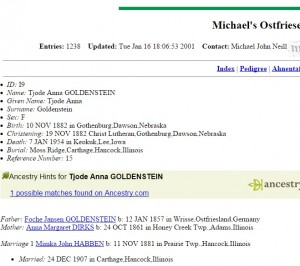You don’t think you’ll ever use an online tree in your compile d research. That means you don’t need to worry about creating any sort of citation for the online trees then, right? If I’m not using information from the trees in my final research then I don’t need to concern myself with how to cite the trees at all.
d research. That means you don’t need to worry about creating any sort of citation for the online trees then, right? If I’m not using information from the trees in my final research then I don’t need to concern myself with how to cite the trees at all.
Maybe.
Maybe not.
My personal preference is to use information in the trees for clues and suggestions to potentially further my research. Others take a different approach.
If you never browse the trees, never look at the trees, and in no way utilize them, then of course you don’t need to cite them because you’ve never used them. That’s pretty straightforward: we don’t cite what we don’t use.
The other extreme is to simply use all the information in the trees without any analysis–copy and paste and copy and paste some more. Technically since the trees were used, they should be cited. The reality is that people who use tree information without analyzing it probably aren’t concerned about citations in the first place.
But what if you use the trees as a forest from which to harvest clues for actual records and materials that could be used to substantiate the information the trees contain? One could take the approach that citing the trees is still not necessary as you’d be citing those original records to which the trees lead you. You used the actual records in your compiled research, not the trees.
That approach, using the trees for clues, is a more balanced one. Some trees contain accurate and conscientious research–others do not. After using other records to “back up” the tree’s statements, I’m probably going to determine which trees are more reliable than others. That’s the main reason for citing the trees–so that I know which trees gave me the more reliable clues. After all, there may be other people in the tree who end up being a part of my research and knowing which trees were more reliable saves me time in deciding which trees from which to take clues.
It would be courteous to acknowledge those compilers in your own compilation, even if you technically don’t “credit” the tree because you used other sources to back up the tree’s statements. You cite what you used. However, crediting the compiler is still a good idea–even if technically it may not be nessary. That acknowledgement generates good will from the compiler and increases the chance that they are willing to post new information as they obtain it and perhaps even to share information with you.
Citing the trees even if for “internal use only” is still done for the same reason that we site sources we would use in public compilations–it helps in our analysis of information. Crediting those who have helped us along the way makes for a better potential working relationship with other researchers.

One response
You are so right! Way back when I got the clue I needed from an online tree. I have no idea which one. I would like to talk to that tree owner now.